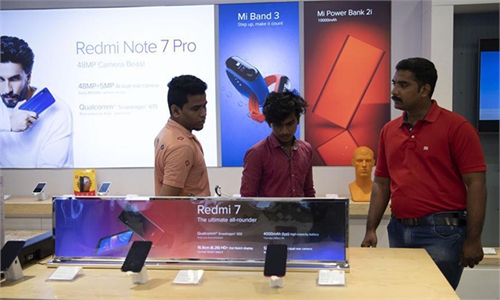COMMENTS / EXPERT ASSESSMENT
US guile in blacklisting Xiaomi Corp may only be a tip of the iceberg

A Chinese employee at Xiaomi's Mi Home in Shanghai Photo: IC
The US government's blacklisting of Chinese smartphone maker Xiaomi Corp may lack evidence to support of its spurious claims of "having military ties," a report of the Wall Street Journal over the weekend showed.According to a legal filing exposed by the US Department of Defense, the reason behind US' arbitrary crackdown on Xiaomi Corp was partly due to Xiaomi founder and CEO Lei Jun having received a national award of scientific innovation in 2019, rather than providing any proof of the company's actual connections with China's military.
Xiaomi's case may be only a tip of the iceberg. There are reasons to believe that a wider range of Chinese companies are suffering similar groundless crackdown from the US government.
Different from Huawei Technologies, Xiaomi doesn't hold any notable advantages in technology development against US tech companies. The company was targeted by the US because the company's cost-efficient products have gained a larger market share in the US last year as US consumers have largely increased their purchase in internet-hooked devices imported from China.
The logic in the US' crackdown on Chinese companies could be easily observed here: if the market occupying rate of a Chinese company exceeds certain level in the US market, it would be targeted by Washington, which provide a warning to more top Chinese companies in a range of industries - it's even not necessarily to be a tech company.
The award, coupled with Xiaomi's ambitious investment plan in advanced technologies such as 5G and artificial intelligence, was enough for the US Defense Department in January to add Xiaomi to a list of companies that allegedly support China's military.
The US' crackdown on Chinese companies are citing a range of shaky and unproven justifications, which showed that the US government lock the crackdown target first, then try to find a excuse to support its move. The arbitrary excuses are not sufficient at the first place, and would lead to more trouble in following dispute settlement process.
The US Department of Defense's laying-out of the detail was reportedly in response to of Xiaomi seeking overturn the military designation at a local court. This provides China and the US a possibility to work out a bilateral dispute settlement mechanism for companies from both sides investing in the other country.
To protect Chinese and US companies investing in each other's legal interests in the future, both sides should engage in frank discussion to reach a bilateral dispute settlement mechanism.
As the Xiaomi case demonstrated, the US is lacking hard facts to support its crackdown on Chinese companies. Such arbitrary moves on alleged or fabricated reasons will certainly hurt the US' global credibility. And, it would cost the US greatly in the future.
This article was compiled based on an interview with Gao Lingyun, a research fellow at the Chinese Academy of Social Sciences in Beijing. bizopinion@globaltimes.com.cn


